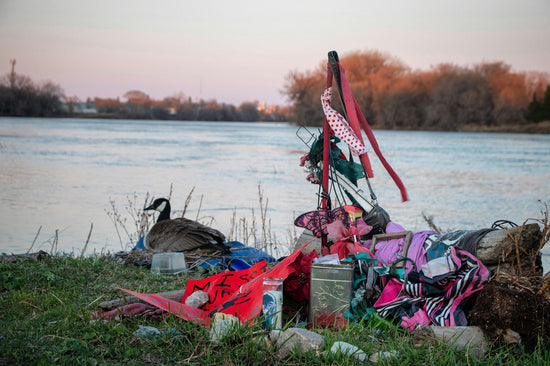It’s easy to focus on the things that are going wrong with our world. We feel like the upper class is getting richer while the poor are getting poorer. We see the effects of environmental racism and social injustice. We wonder if the damage we’ve done to the ozone layer and our natural environment are decades from recovery (or if it will recover at all).
Our brains are wired to hold on to bad news more than good news - it’s how we used to survive. The media knows this, and they concentrate on these headlines because that’s what makes for interesting news. But, hold onto your butts. I’m gonna tell you something that’s gonna make your brain explode just a little bit: The world is doing better than you think.
Between our negativity bias and the media’s presentation, we miss certain truths. It makes sense, as very few people are out there telling us that there’s good things happening in the world, or that progress is being made. But it actually, really is.
Here’s a few great things that are happening in our world:
The world isn’t as poor as we think
When Swedish physician Hans Rosling polled people from countries all over the world, he found that most people assume that the population of people living in extreme poverty has increased significantly. In reality, only nine percent of the world’s population lives in low-income countries. Three quarters of the global population actually lives in middle income countries.
That wasn’t the case a while back. In 1800, nearly the entire global population lived in extreme poverty. In the last 20 years, the world population living in extreme poverty has almost halved.
Contrary to belief, some countries aren’t simply doomed to be poor. Nearly all countries around the world have progressed and managed to pull themselves out of poverty.
Solar energy is getting more affordable
Between 2009 and 2017, the cost of solar energy went down 86 percent. By 2017, the cost of solar was less than half the price of coal. Not only that, but the cost is projected to continue decreasing over the next decade.
This is because unlike fossil fuels, solar is a technology, not a finite resource. As technology develops, it becomes cheaper. A report from Bloomberg New Energy Finance found that by sometime around 2027, it will cost less to run solar and wind than to run existing coal and gas operators.
This means that we’re making our way toward replacing fossil fuels with clean energy - a win on so many levels.

Source: Lazard Cost of Energy Analysis, 2017
The ozone is starting to recover
We hear a lot about the overwhelming amount of greenhouse gas emissions that we’re constantly pumping into the atmosphere. While it may seem like we’re in a constant battle to halt these damaging practices, the truth is that countries working together have made real progress.
The Montreal Protocol was agreed upon in 1987 and put into full effect in 1989 with a mission to phase out man-made products that deplete the ozone layer. In 2012, the Protocol reached universal acceptance, with all countries signed on. Because of this, emissions of ozone-depleting substances have decreased by 98% since 1986.
To realize that we’ve collectively gotten the entire planet to eliminate these substances is incredible. Better yet, we’re even seeing the initial signs of recovery. Ozone concentrations have slowly started to rebuild.
Chlorine concentrations in the ozone are projected to decrease according to the graph below:

While it’s likely to take many more decades to achieve a full recovery, this is a perfect example that environmental protocols really do make an impact on our world.
Teen birth rates in the U.S. have dropped significantly
The teen birth rate has been on a steep decline since the 1990s, and is now at an all-time low of 17.4 births per 1,000 teen women (less than two percent).
This number reflects the amount of live births, and doesn’t include stillborns, miscarriages, or abortions. However, the teen pregnancy rate, which includes all those scenarios, has also plummeted from 117.6 in 1990 to just 43.4 in 2013. That means it went from about twelve percent to four percent, a major decrease.
The reasons for this are twofold - teens are better educated on their choices and are having less sex. Since the early 2000s, the percentage of females who reported using contraceptives has increased. Along with this, abortion rates have declined among teens to about one quarter of the rate it was in the 1980s.
People are more educated and literacy rates are up
Literacy has continued to increase every year for decades. Now, more than 86% of adults are literate. People across the world are going to school for more years, and global estimates of school attendance are above 80%.
There are still inequalities in geographical regions, but the gaps are narrowing. Even in areas where education is less attainable, major improvements have been made. Countries in the Middle East and Northern Africa, where literacy rates have been lowest, have seen stark differences in just one generation.
Based on literacy estimates by age group, this trend will undoubtedly continue to rise. Younger people are much more educated than they used to be, which shows us that as the population ages, literacy rates will increase.

Access to the internet is increasing
In the relatively short lifetime of the internet, it has spread at a rapid pace. Now, over half of the world’s population has gained some access to the internet.
The internet allows people and economies to advance. In developing countries, internet access has the power to lift individuals out of poverty (especially for women and girls). It means having better access to education and information. It can lead to groundbreaking changes in important areas like transportation, industry, and energy.
The world isn’t as dangerous as we think it is
We tend to have a view of the world as if it’s a very dangerous place to live. We fear terrorism, gang violence, and war. When it comes to political issues, more people in the U.S. are concerned about terrorism than they are about the environment. But the truth is, the odds of an American dying in a terrorist attack is 1 out of 3.3 million.
When polled, nearly two thirds of people believe that crime has increased, when in reality it has continued to drop every year. Violent crime has been declining between 51 and 71 percent since the 1990s.
Homicide rates have fallen dramatically. The supply of nuclear weapons worldwide has gone down. Death from war has declined steeply since the 1940s.
More diversity is being represented in political leadership roles
The world has been predominantly run by white men for as far back as history goes. It’s taken a long time to change, but slowly we’re seeing more diversity in leadership roles across the globe.
In the United States, we’ve seen some of the first women of color being represented in leadership roles in recent years. Ilhan Omar and Rashida Tlaib became the first Muslim women elected to Congress, in 2018. We’ve also seen the first Native American women elected to Congress, and Michelle Lujan Grisham became the first Democratic Latina governor in the U.S.
In fact, our current Congress in the U.S. is the most racially and ethnically diverse it’s ever been, with non-whites now making up 22 percent.
Worldwide, the number of female national leaders in a year quadrupled between the 1950s and the year 2004. Megawati Sukarnoputri was the first female president of Indonesia, serving in the early 2000s. Gloria Macapagal-Arroyo was the first woman to hold two of the highest offices in the Philippines: Vice President and Speaker of the House. She later served as President.

Female leadership around the world. Source: Columbia Journal of International Affairs
Similarly, more people in the LGBTQ community are holding positions of power. It was in 2009 that Iceland’s Jóhanna Sigurðardóttir became the first openly gay head of government in the world when she was elected Prime Minister. Since then Belgium, Luxembourg, Ireland, and Serbia have all elected LGBTQ members as Prime Ministers.
As of today, several thousand openly LGBTQ politicians are representing at city and national levels. In 2018, Lupe Valdez was the Democratic nominee for the Governor of Texas. Had she won, she would’ve become the nation’s only Latina and openly lesbian governor, which shows a major shift in how the American south views same-sex relations.
Most recently, Oklahoma elected the country’s first-ever nonbinary lawmaker. Mauree Turner, a black, queer Muslim, won a seat on the Oklahoma state legislature on November 3rd. Turner is among a group of LGBTQ candidates that made historic firsts this year, but the number of barriers broken in this one seat is incredible.
The year 2020 will be long-remembered as a stress-filled pig pile of one tragic event after another. We continue to push through a global pandemic that’s changed our lives in unforeseen ways and divided our country even further apart politically. Systemic racism is a problem long from being solved. Climate change is causing severe weather events and devastation. Violence and riots have broken out in our streets. Needless to say, it’s been a really tough year.
So, when all the headlines are getting you down, just remember - there’s a lot of good going on out there, quiet and underreported, but nonetheless happening.






3 comments
Thank you so much. This year it’s been especially hard not to feel like everything is turning out for the worst. I’m going to save a copy of this article and reread it when I need a break from all of the doom and gloom in the papers and the effects of the pandemic I am seeing.
Thank you for some good news! Much needed!!!
I really needed to read this today. Been seeing a similar message from Steven Pinker. We need to be reminded of HOPE! Thank you!